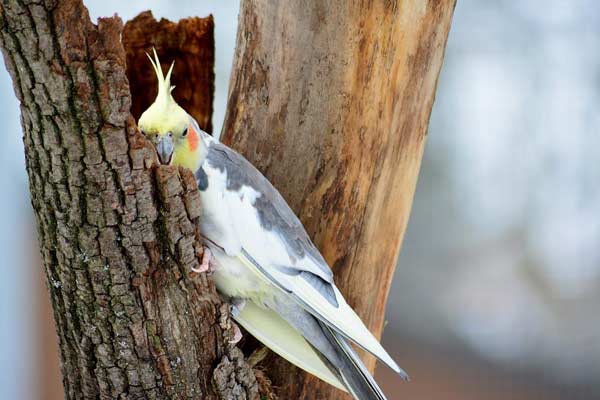The cockatiel is a parrot that has made its way into the hearts of many bird lovers. With its interactive nature and noisiness, this small, beautiful bird can be a lifetime companion or an entertaining pet.
Both males and females are beautiful with their puffy yellow faces, orange cheeks, white chest feathers, and multi colors of wings.
They love to stick out their heads and whistle, but it’s not uncommon for them to make loud screeching noises from time to time.
Are Cockatiels Sensitive to Smells?
Cockatiels are sensitive to smells, and they don’t like them. They can be very sensitive to the smells of cleaning products, perfumes, air fresheners, and other scents. If you’re using any of these products in your home, keeping your cockatiel out of the room where they’re being used is best.
How is the Nasal Part of a Cockatiel Structured?
The nasal structure of a Cockatiel is pretty simple. The nasal passage is a single tube that begins at the nostrils and ends at the glottis, where it meets with the trachea. It is lined with ciliated epithelium, which helps to cleanse and moisten these pathways.
The nasal cavity contains turbinates, bony structures that help warm and humidify the air before it reaches its destination. In addition, Cockatiels have two nasal conchae – small bones supporting the turbinates.
Cockatiels have a much lower number of olfactory receptors than other birds. This is why you don’t see them using their beaks to sniff food like wild birds.
The olfactory bulb is located near the bottom of the brain, where it receives signals from sensory neurons and sends them along nerve fibers to other parts of the brain, where they can be interpreted.
Toxic Smells That are Lethal to Cockatiels
Gasoline
Gasoline can be lethal if inhaled by your cockatiel. It is easily absorbed through the lungs and will cause severe respiratory distress. If your cockatiel gets a whiff of gasoline, it needs immediate treatment with oxygen therapy and medication.
Ammonia
Ammonia is a standard cleaning product used in homes and businesses. Inhaling ammonia can irritate the respiratory tract, causing your cockatiel to have difficulty breathing and possibly suffocate from fluid buildup in its lungs.
If your cockatiel gets a whiff of ammonia, immediately give it an oxygen therapy treatment to help clear its airways and prevent further damage or illness from occurring due to exposure.
Paint Thinner
Paint thinner contains strong chemicals that can burn your bird’s skin if exposed for too long or ingested by accident (if they eat paint).
The fumes produced by paint thinner are also dangerous because they contain volatile organic compounds (VOCs) that can irritate their lungs.
Perfumes or Colognes
Perfumes contain strong chemicals that can harm your bird if ingested or inhaled. The effects can range from mild discomfort to severe illness, including death.
Smoke or Smoky Atmosphere
Smoke in the atmosphere contains carbon monoxide, which is toxic to birds and humans. If there is any smoke in your home, whether it be cigarette smoke or cooking fumes, ensure your bird is out of harm’s way until it clears out completely before bringing him back home.
Potpourri or Scented Candles
Scented candles contain various oils that may be harmful if breathed in by your cockatiel since some of these oils can irritate the respiratory tract causing swelling of the airways, which could further lead to pneumonia and even death if not treated quickly enough.
Can a Cockatiel Know its Owner by Scent?
Cockatiels will often recognize their owners by sight and follow them around the house. They can be trained to do this from an early age by keeping them in a small area and rewarding them for coming back when called.
The cockatiel’s poor sense of smell also means that it doesn’t have a favorite toy or treat. If you want your bird to like something, try placing it in its cage for a couple of days and see if it will start playing with it on its own accord before trying any training techniques.
Can You Use Scents to Attract Your Bird?
Some people use scents such as vanilla and cinnamon to attract their cockatiel. This can work if you’re trying to get your bird out of its cage, but it’s not a good idea to use these scents as a long-term solution for training.
The reason is that some birds can become dependent on the scents and refuse to come out of their cages without them.
What Scents Can a Cockatiel Tolerate?
The following scents are generally safe for cockatiels:
Lemon Essential Oil
This oil is good for cleaning the cage and keeping your bird’s feathers healthy. It also has a fresh scent that’s pleasant for humans and safe for birds.
Orange Essential Oil
The orange essential oil positively affects mood, stress, and energy levels. It can help calm your cockatiel down when she’s feeling anxious or stressed out.
The smell can also help keep her calm while she learns new tricks or performs other activities that require her full attention.
Frankincense Essential Oil
This is another excellent oil that can keep your cockatiel calm and relaxed during training sessions and other activities that require focus and concentration on her part.
It also helps relieve some skin conditions such as psoriasis and dandruff, so if you notice any of those symptoms on your bird’s body, give her frankincense oil orally or in her drinking water once a day until they go away completely.
If you are not yet an owner of a cockatiel, you may know someone who has one or already has made the decision to get one as a pet. Cockatiels are great birds and make very social pets. But did you know that because they are very social animals, they can also be very sensitive?
The loud noise of a hairdryer or the strong smell of perfumes may cause them stress, so it is recommended that you limit their exposure to those things.
